Tag: Scholarships K-12 and College
Updates from NYF President Som Paneru
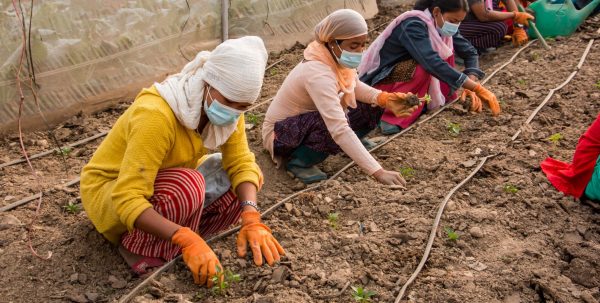
Dear NYF Community,
I hope you are all continuing to stay safe and healthy. Earlier this month, the Nepal government made an announcement to ease COVID-19 restrictions. Among other things, this included the physical re-opening of schools and public spaces. This decision has several impacts on our programs at NYF, and I am delighted to share these new updates with all of you.
COVID-19 Updates & Response Programs
NYF’s COVID Isolation Center at our flagship Nutrition Rehabilitation Home (NRH) ran until September 16, 2021. Since its opening, we’ve admitted and treated more than 240 COVID-positive patients at our facilities. Following this recent government decision to re-open public spaces, NYF suspended isolation center services on September 17th to fully resume our regular NRH programming. We are continuing to produce Lito, our homemade “super” flour, at the NRH and are still distributing them to communities in need via the Lito for Life program. For more updates and information about our COVID-19 response, visit NYF’s COVID Timeline.
Education
Until now, schools and colleges nationwide have been closed. Out of the 643 scholarship students NYF currently supports, 70% have been attending online classes run by their schools and colleges. After this most recent decision, most NYF children will likely be able to return to in-person classes later this fall. Additionally, after a massive COVID-related delay, the long-awaited examinations for grade 12 students finally took place on September 15, 2021. About 40 NYF students took the exam.
Vocational Education & Career Counseling
As you may recall, most of our vocational training programs were put on hold earlier this year. We are happy to announce that NYF has safely resumed some training programs in the electrical, welding, carpentry and plumbing trades. Effective last week, we have 4 vocational training satellite courses currently running. NYF is also preparing to complete 2 more Sustainable Agriculture and Entrepreneurship Trainings (SAAET) by the end of the year.
Nutrition Rehabilitation Homes (NRH) & Nutrition Camps
There are currently 8 children being treated at the NRH for malnourishment. We are expecting an increase in the number of admissions as we resume our regular services and programming. Our NYF nutrition staff is also busy strategizing how to safely conduct our regular nutrition camps this year.
New Life Center (NLC)
Due to travel restrictions brought about by COVID-19, patients had a difficult time traveling to the New Life Center in Kathmandu Valley to receive treatment. In order to increase access to supportive care for children living with HIV/AIDS in rural communities, NYF has redesigned the NLC program.
The aim of this redesign is to bring New Life Center resources to a larger population of children. To do so, we’ve moved beyond the “residential-treatment only” approach to an expanded “outreach and community-based” approach. According to the new plan, the NLC will cater residential services to approximately 20 children, while all the other services will be completed in rural communities via community outreach. These community outreach programs include awareness and advocacy, food and essentials delivery, financial support for caretakers, and tele-counseling services.
While this program will still be run from the NLC office in Kathmandu, we are excited to partner with a number of grassroots organizations — all doing incredible work in the communities we plan to serve.
Olgapuri Children’s Village
First and foremost, all 71 children (and house parents!) at Olgapuri remain safe and healthy. This year, nine students will soon be moving out after graduating high school. We are so proud of each graduate, and look forward to seeing them go on to do incredible things!
Thank you for your support.
Friends, we are deeply grateful for your continued love and support for the children, young adults, and families in our care. Thank you, also, to our staff on the ground in Nepal and for their incredible work. As always, if you have any questions about these updates or would like more information about our programs in general, please don’t hesitate to contact us at info@nepalyouthfoundation.org.
With gratitude,

Som Paneru
NYF President
Olga Inspires on CBS Evening News: Still Sharing Her Life’s Mission

Olga inspires just about everyone she meets, so the NYF team was delighted when CBS Evening News with Norah O’Donnell asked to feature her recently.
Viewers who tuned in for the spot’s original airing on the night of July 5th, 2021 learned a bit about Olga’s mission: extending educational opportunities to Nepal’s children, as well as providing health, freedom, and shelter.
We are so grateful to CBS News correspondent Jamie Yuccas for helping Olga inspire new audiences with her story of personal impact in a world that often downplays “women of a certain age”. With support and solidarity from friends around the world, Olga and NYF are helping Nepali children chase their dreams and build brighter futures for themselves, their families, and their communities.
“I don’t think about stopping,” Olga says. And neither does the global NYF team. Thank you all for being part of this incredible continuing journey!
You can watch the full segment on YouTube or Facebook. CBS Evening News also tweeted about this special segment, which can be viewed here.
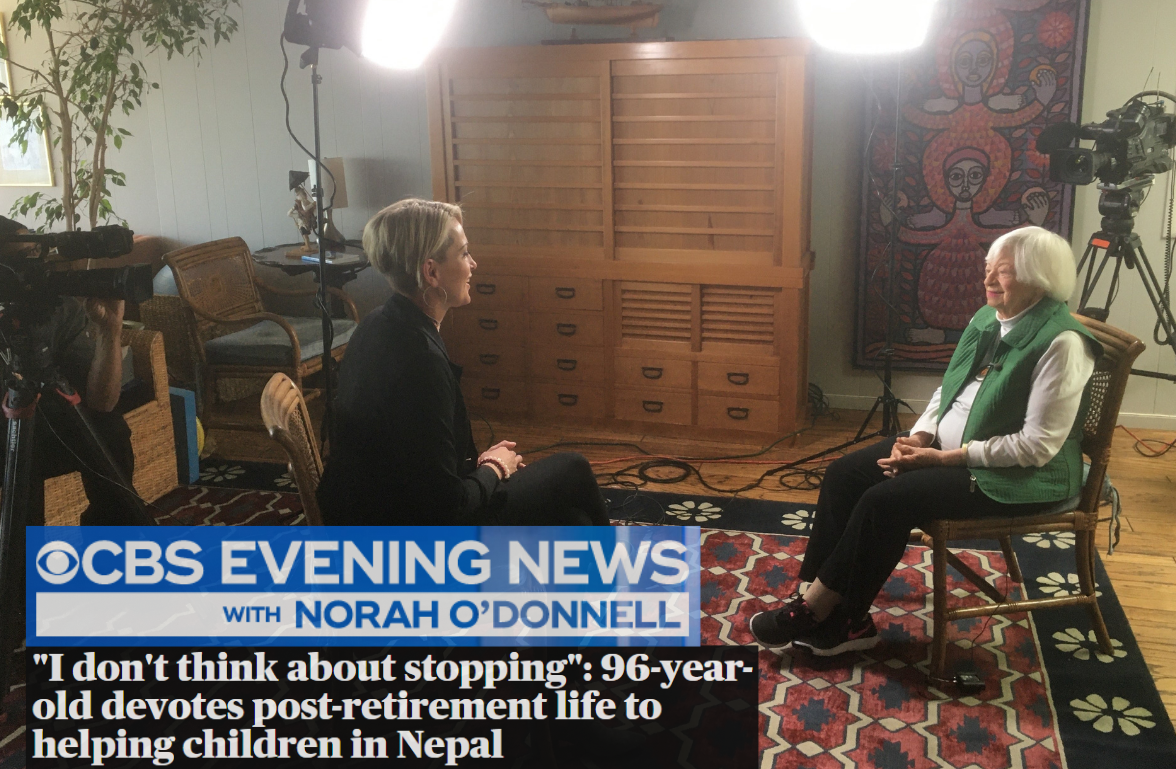
Frontline Warrior: NYF’s Lila Tharu Celebrates Freedom Day by Saving Lives
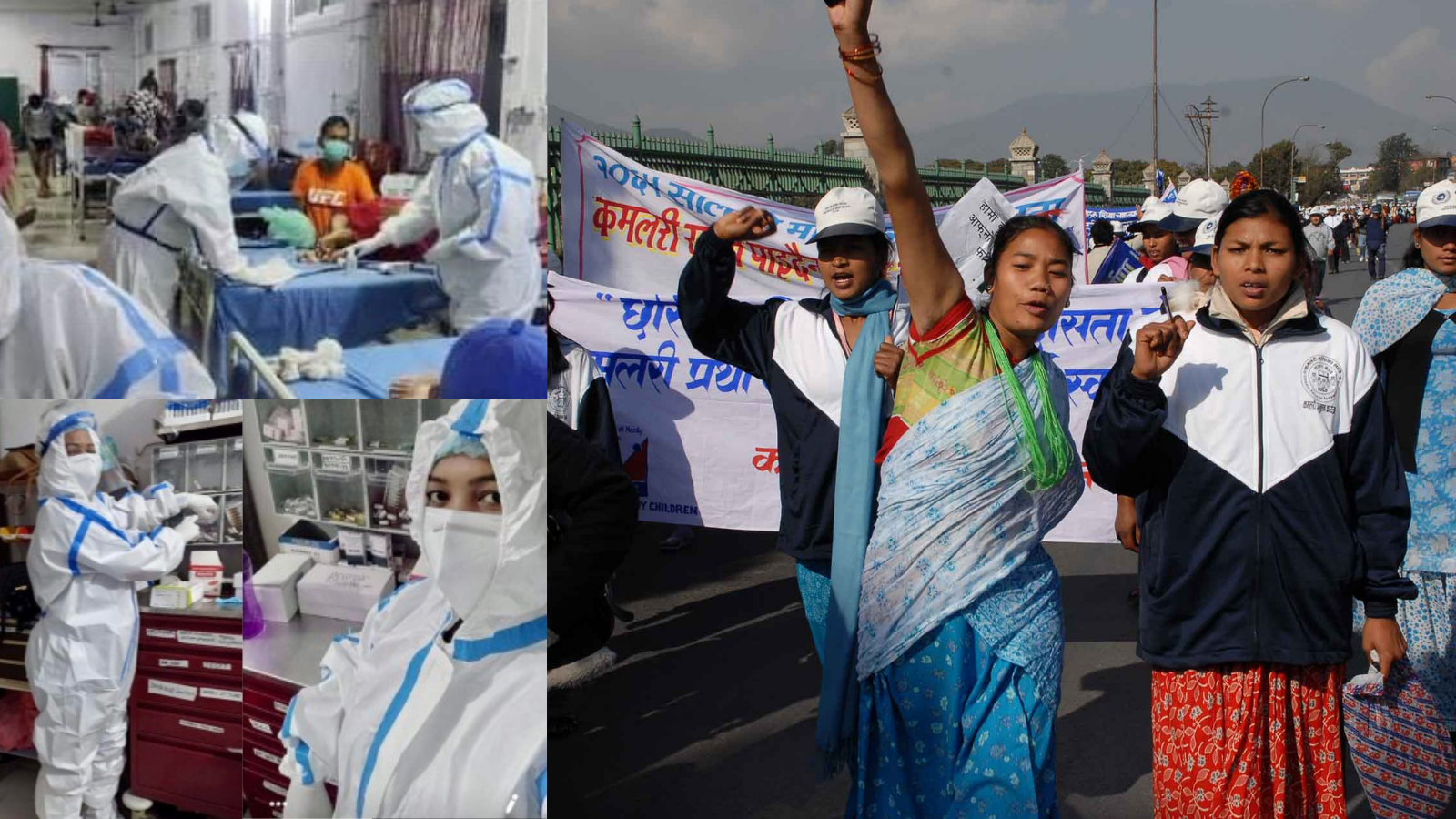
Frontline warrior healthcare workers across the world have spent nearly 18 months battling COVID-19 to defend their communities. These heroes have saved countless lives during the pandemic.
For one of these warriors, Lila Tharu, age 26 (below), her status as a nurse and midwife is a source of particular satisfaction. NYF is proud to count Lila among our many accomplished alumni now to heal their communities during this crisis.
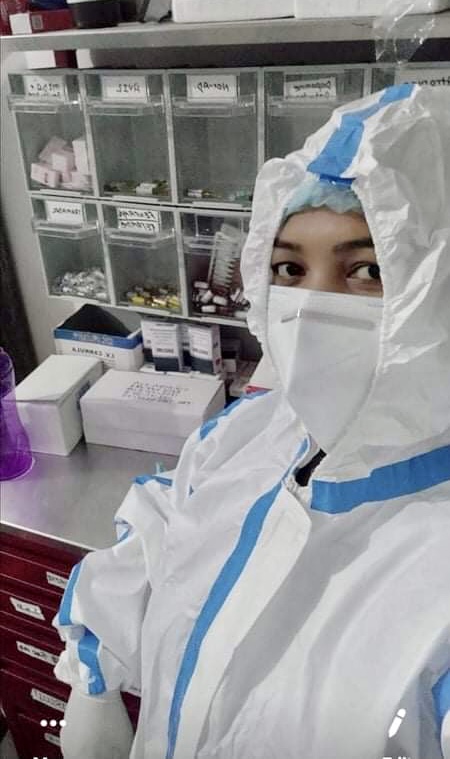
Kamlari Freedom Day
June 27th, 2021 marks the 8th anniversary of the legal abolition of the kamlari practice in Nepal—otherwise known as Kamlari Freedom Day.
Kamlari was a form of indentured servitude which exploited the daughters of the Tharu ethnic minority group in Western Nepal’s Terai region. After generations of predatory lending by more powerful “land-owning” groups, the practice emerged as the only way for families to pay back exorbitant generational debts.
At every Tharu New Year, parents sold their daughters—some as young as six years old—to work long hours in the homes of strangers. In return, families would receive an average of only $30 for an entire year of their child’s labor. Thousands of Tharu girls spent their entire childhoods in kitchen slavery. Some never returned home.
To people in the Western Terai, the kamlari practice had come to seem inevitable. It was a baked-in cultural truth that very few people dared to question.
Lila Tharu – Kamlari Life, Rescue & Education
Lila was born in Thakurbaba Municipality in Bardiya District. When she was 12, Lila was sent away to work as a kamlari in 2005. Her two older sisters had also worked as kamlaris.
After two years working in her master’s house and being denied an education, Lila was identified and rescued by Nepal Youth Foundation in 2007. Through the Indentured Daughters program, her family was provided with economic support to offset Lila’s lost “wage.” It also included the materials needed to allow Lila to return to school: a kerosene lamp to study by, a school uniform, notebooks, and more.
Lila was a determined student who dreamed of becoming a midwife. Soon after her rescue, she enrolled in grade 7 at a local school. She completed high school (10th grade at the time in Nepal) in 2012, passing her country’s notorious SLC “Iron Gate” exam. Lila earned a place in the Auxiliary Nurse Midwife program at Sushma Koirala Memorial Institute in Nepalgunj. NYF provided her with a college scholarship throughout her studies.
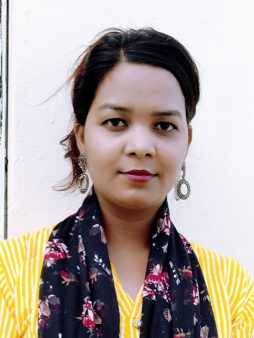
NYF continued to provide career support as Lila began her nursing career in a private hospital in Banke District. And in November 2016, she finally landed her dream job as an Auxiliary Nurse Midwife at Bheri Hospital in Nepalgunj, the largest government hospital in the region. She has remained there ever since, continuing her education by taking Nursing Care and Skilled Birth Attendant trainings to further enhance her skills.
The salary she brings home each month is far beyond what members of the Tharu community thought possible for one of their daughters only 10 to 20 years ago. Not only is Lila serving a critical role in her community’s health system—she is proving the incredible potential within a Tharu girl.
Lila Tharu – Frontline Warrior
At the beginning of 2020, Lila was living at home with her mother while continuing her career. Lila’s father had passed away years before, and her two sisters were now married.
Things changed in Lila’s work life when the pandemic hit. She was added to a special COVID treatment team early on and assigned temporarily to nearby Sushil Koirala Cancer Hospital in Khajura. This hospital had been set aside especially for COVID patients. Lila worked there for several weeks during the pandemic’s first wave. She also served COVID patients in mandated isolation in a Kalpatri hotel during this time.
Now, during Nepal’s intense second COVID wave, Lila’s hospital in Nepalgunj is at the epicenter of the crisis. Many young people from Western Nepal cross the border into India to find work. When the virus surged in India earlier this year, they fled back north to escape the pandemic—not realizing they were bringing the virus home with them.
Bheri Hospital now has four dedicated COVID wards. Lila (below, in white at far right), who has valuable COVID Care experience from 2020, is a frontline warrior in one of them.
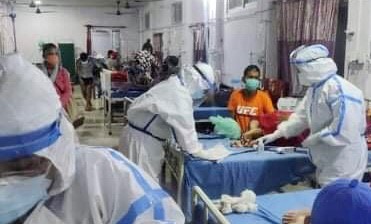
She is hard at work monitoring her patients’ vital signs, measuring oxygen levels, and providing intravenous therapy and medicine, as well as other critical care. COVID death rates for hospitalized patients are frighteningly high everywhere, and Lila’s ward is no different. During this second surge, they have lost an average of 3-4 patients per day. But Lila tries to remember the lives she has helped to save as well. Many of her surviving patients would not be able to return home if not for her.
In spite of rigorous safety protocols, Lila herself caught COVID in the spring, like many other frontline warriors across the world. Fortunately, her symptoms were mild. After a short isolation, she returned courageously to the COVID ward to continue her lifesaving work.
She will continue this work until her expertise is no longer required in the COVID ward. She (below, preparing medicines for a patient) is proud to be doing this important work in her community—and grateful to the NYF Community for making her journey possible.
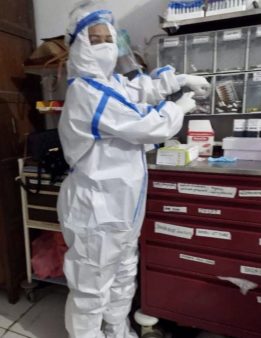
Just One Story of Thousands
Lila says she was afraid when the virus first arrived in Nepal. But now, she is extremely dedicated to the community she serves. Her courage is nothing new to NYF.
Like the other Freed Kamlari women, Lila had already experienced intense hardship and taken many daring steps before COVID arrived. Together, while most of them were still children, these girls dared to challenge their communities, abandon their masters, question their culture, and declare their own worth. Many of them returned home to families who resented them for taking such bold steps. Others were injured while marching for kamlari freedom, as police objected to the girls’ protests against the government.
Lila is one of thousands of Freed Kamlari who refused to stop simply at being rescued from an exploitative practice.
She and so many others have claimed their personal power by seizing educational opportunities and chasing their dreams – and working to lift their sisters and daughters in the process. Some are becoming lawyers, determined to defend human rights. Others have become small business owners or specialized farmers, gradually building personal and generational wealth in ways their parents could not.
And some, like Lila Tharu, dreamed of helping others in the healthcare field. They’ve grown up to be frontline warriors in a global crisis they never imagined.
Happy Kamlari Freedom Day, Lila!
Happy Freedom Day to ALL of the Freed Kamlaris
and to the young girls and women who will never be bonded away!
And Happy Freedom Day to the NYF Community—to everyone who helped support this incredible program. Lila’s story, and so many others like it, are proof of the amazing way your #LoveWorks.
Celebrate with NYF today.
To help celebrate this joyous occasion and support the education of brave young women like Lila, please make a thoughtful gift for NYF Scholarships or our Vocational Education program on our donation page. Additionally, join the NYF Community by signing up to receive emails here.
Keeping our Promises – An Overview of NYF Programming During a COVID Surge
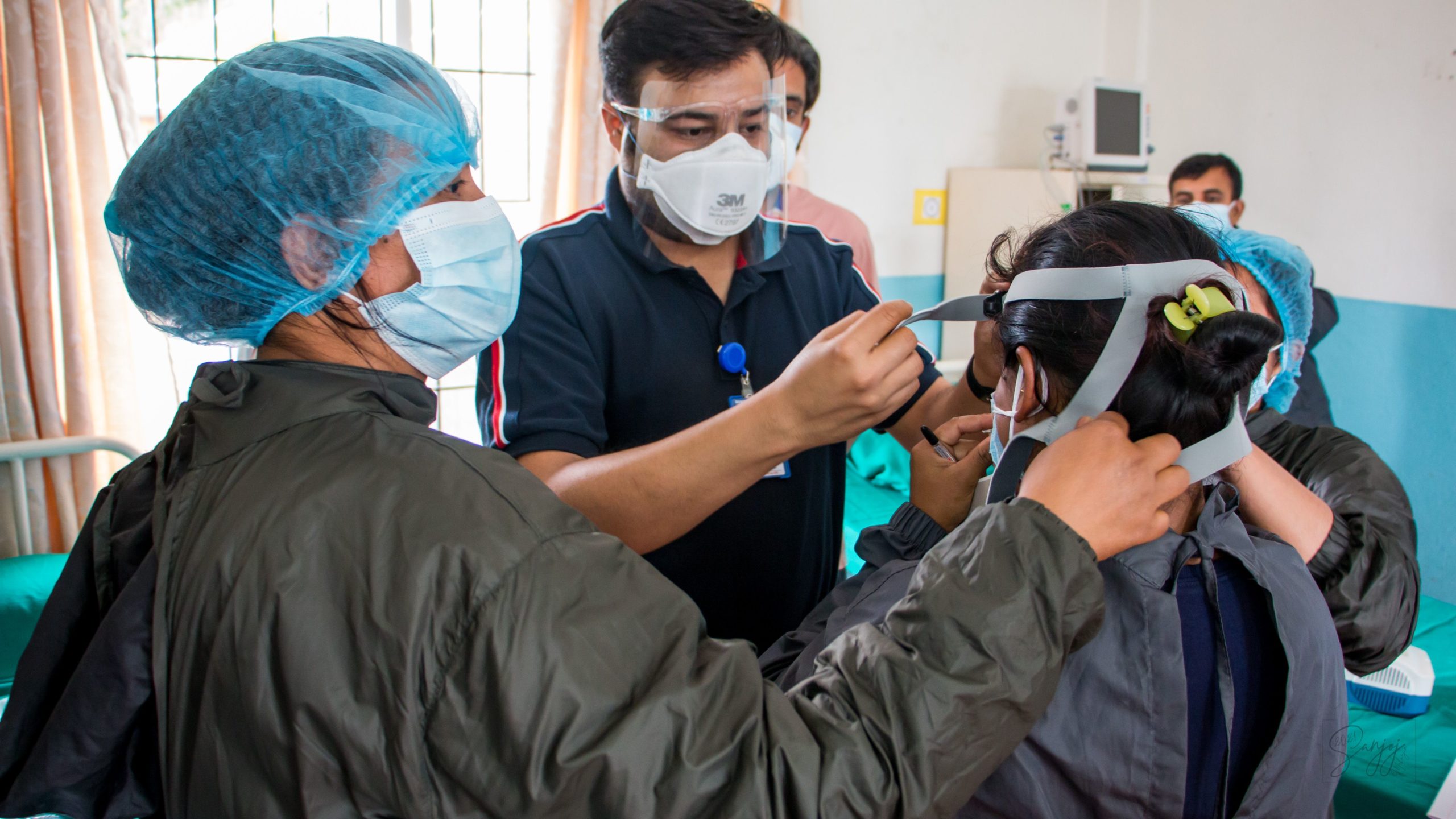
Keeping our promises to the children already in our care is of the utmost importance to NYF in ordinary times. But in these extraordinary times, we’re proving our commitment in ways that build trust, enhance lives, and ensure that the NYF community’s #LoveWorks.
As a follow up to Som’s interviews with the BBC on May 6th and May 24th, our US Team spoke to Som, NYF’s president, on Monday evening (May 24th, 2021), to get a broad update on our programs during Nepal’s unprecedented second COVID wave.
Here’s what we learned:
Regular Programs
When the pandemic first hit in March 2020, NYF pivoted quickly – but those first few months in lockdown weren’t easy! (Click here for our COVID timeline.) Like people throughout the world, our staff members and the children we serve had to think creatively to find necessary equipment, develop safety systems, and share information.
Fortunately, after a year of COVID safety measures, this new lockdown in Nepal is easier for our regular programs to navigate. Som says it was very simple for staff members to “switch gears” back into lockdown-mode.
Olgapuri Children’s Village – After a brief safe window of returning to school outside of Olgapuri campus, the village is now in strict lockdown again. Olgapuri (below) continues to be one of the safest places in Nepal during the pandemic. You may read more about Olgapuri in lockdown by clicking here.

Ankur Counseling Center – Our counselors at Ankur are continuing to work hard from their home offices, providing regular mental health care to the children in our care, staff members, and others within the community. They have been providing extra support during the second wave to individuals in our COVID Isolation Center as well. (Click here for more Ankur stories!)
Olgapuri Vocational School – Most of the courses planned for this time period have had to be postponed for the safety of staff and students, but one vocational course is actually ongoing!
This group of 20 Freed Kamlaris at Olgapuri Vocational School was nearly through their mandatory quarantine period when the government shutdown began. Since Olgapuri is a completely locked down campus, the young women and NYF staff all agreed that they were safer here than they would be if they travelled home to the Western Terai. Their vocational training program is proceeding almost as normal.
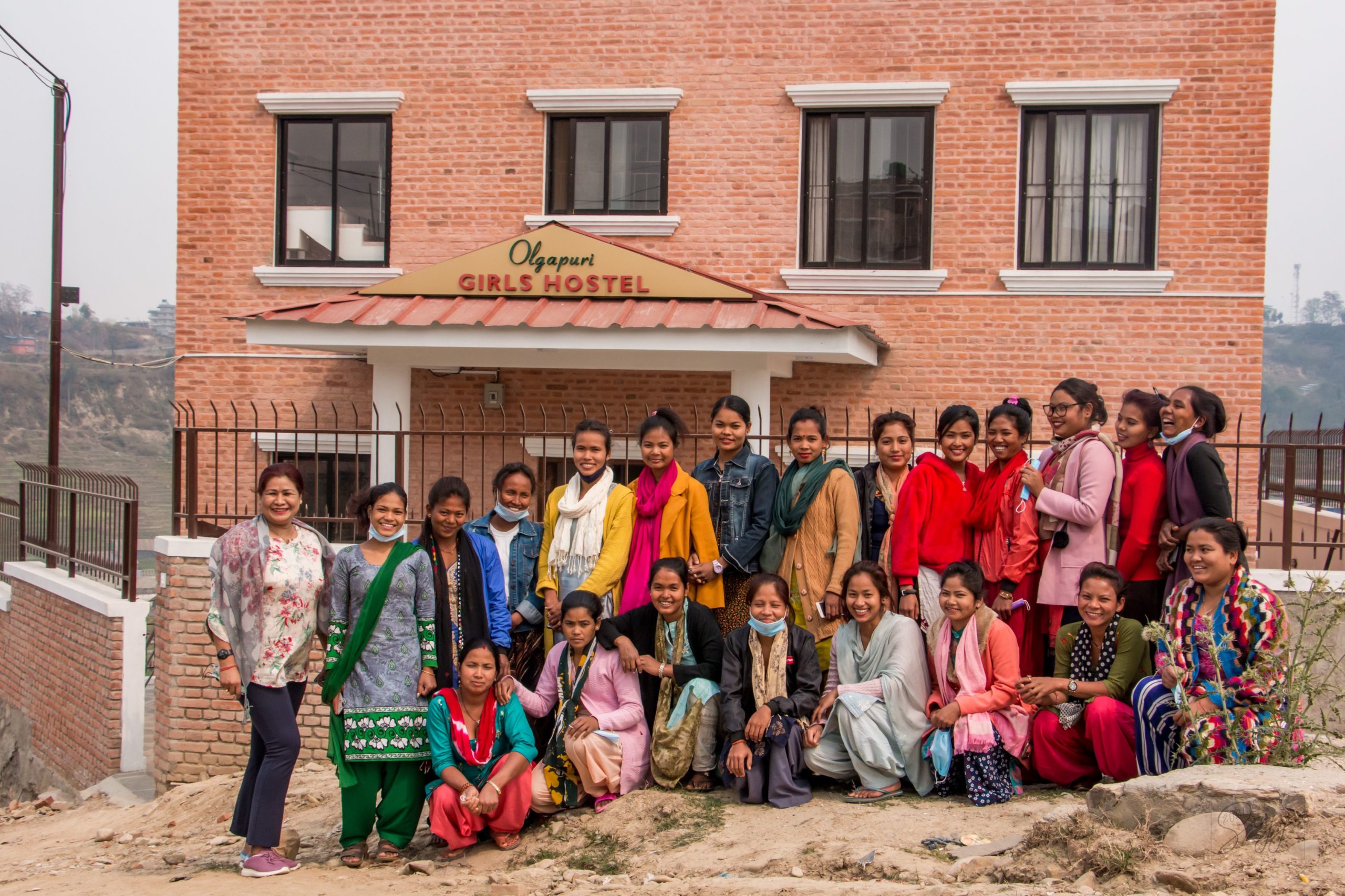
A second program was recently completed in a very remote, isolated village in northwest Kathmandu Valley. The program was well underway when this second surge began, and because the trainer was already in the village with all of the necessary equipment, and because the village is so remote that locking it down was simple, students and NYF staff agreed that this, too, was a safe option for continuing as usual. The new program graduates will be able to put their vocational skills to work once the economy reopens.
As the situation evolves in Nepal, programs like these will be decided on a case-by-case basis, with special care taken to protect staff members and students alike.
Scholarships & Kinship Care – NYF’s team has stayed in regular touch with scholarship recipients and families receiving Kinship Care stipends to ensure they are safe, well-fed, and continuing their education as best they can.
Schools around Kathmandu Valley are now able to provide online learning. The main disruption being experienced by our students is exam scheduling, which has been out of sync for over a year. Final exams across the country will be postponed until it is safe for groups to gather again. This may extend the length of some students’ studies.
Nutrition – NYF’s regular Nutrition staff – those who run the Nutritional Rehabilitation Home in Kathmandu – are currently working completely on COVID response, including Lito for Life and the COVID Isolation Center.
At NYF, we are so grateful for the hard work and dedication that allows these critical programs to continue. Thank you for helping us keep our promises to the children already in our care!
Emergency Programs
Lito for Life – Lito for Life is ongoing. (Click here to learn about this program.) Due to the current surge, no “super flour” is currently being produced, but our stock of already-prepared and packaged Lito is still being distributed, along with other staples like rice and potatoes. To ensure safety, our team members are not making deliveries door-to-door, but we are providing packages to orphanages, children’s hospitals, long-term care facilities, food banks, and other locations where individuals can access this critical resource.
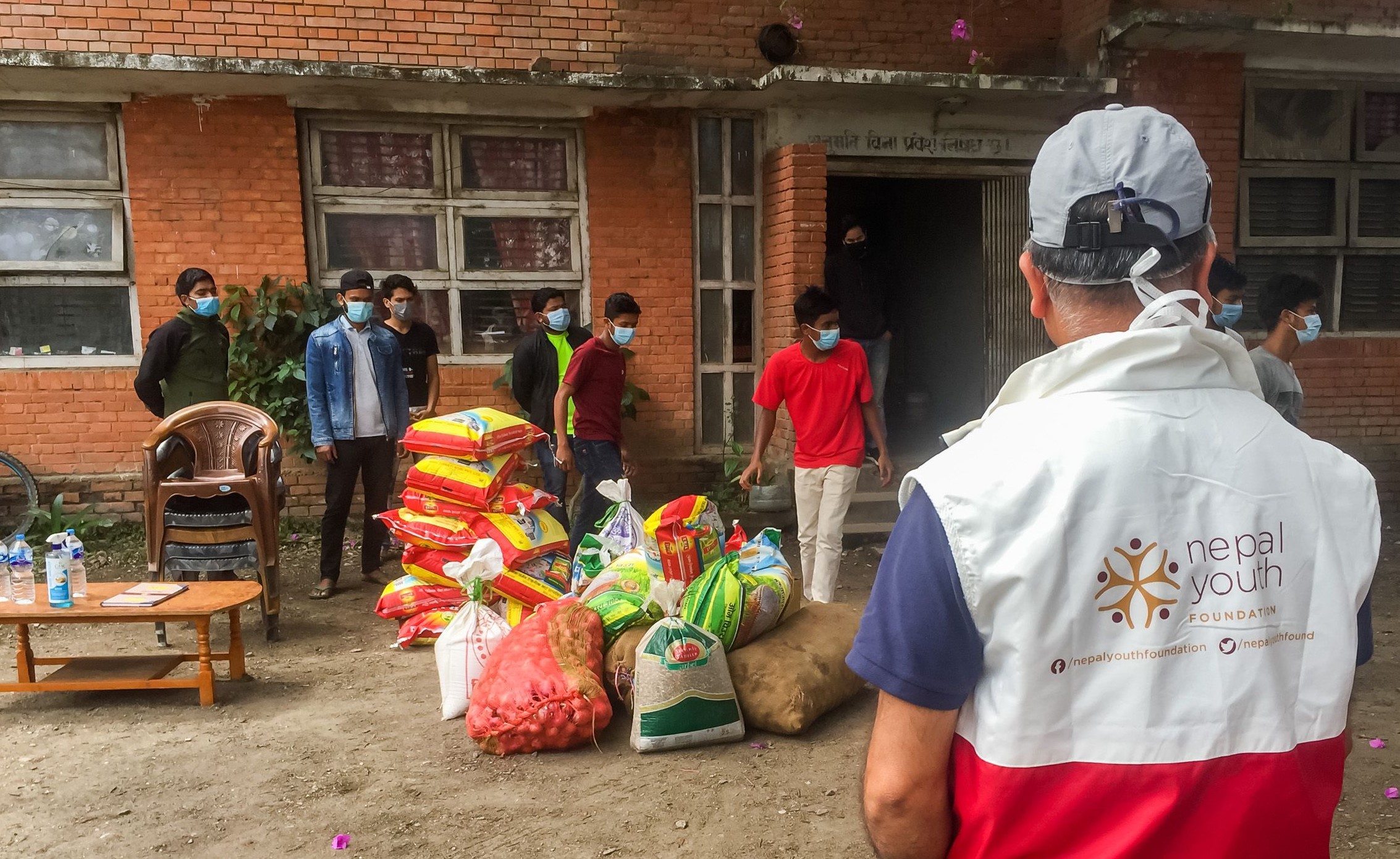
COVID Isolation Center – Our Kathmandu Valley Nutritional Rehabilitation Home and the adjacent New Life Center are being used as a COVID Isolation Center for individuals who have tested positive for the virus and are asymptomatic or experiencing mild to moderate symptoms. The resource is designed to allow individuals to isolate away from their families, to slow the spread. Our patients are coming mainly from orphanages, college dormitories and hostels, boarding schools, and housing shared by multiple generations and families within a tight space.
Most of our patients are children and youth, but we serve adults as well. Our youngest patient so far was an 8-year-old girl from a local orphanage, who was isolating with us to protect her 50 friends at home. Our oldest patient so far was a 73-year-old man. He has recovered and returned home to his family.
Many individuals who are isolating at home do not recognize when their symptoms have become too dangerous – and by the time they reach the hospital, it is too late to save them. At our COVID Isolation Center, patients are under the observation of trained medical professionals who know when an individual needs care in a hospital setting. The ambulance ride to the hospital is provided free of charge.
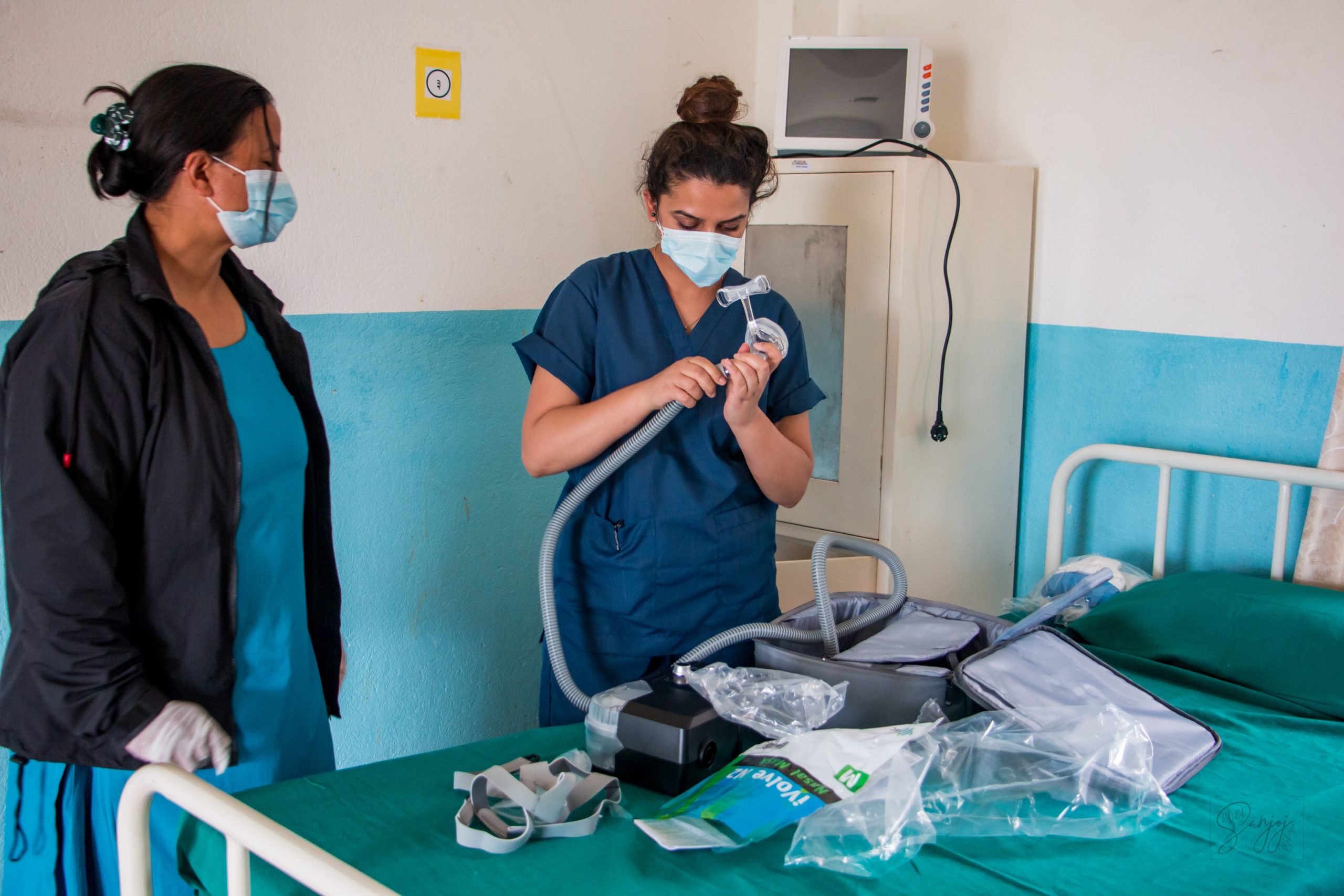
This week, our staff members received special training from a local doctor and his team to ensure that these patients stand the best chance possible as they wait for an available hospital bed to be located. Four beds at the COVID Isolation Center are being set aside for a “High-Dependency Unit” or HDU (above). Patients in need of hospital intervention will be moved to this area and held here, under stabilizing, high-level care and using special equipment, until NYF is certain a hospital ICU bed has been found for them.

We are looking forward to sharing more about this work soon!
What Comes Next?
The situation in Nepal is evolving quickly, and NYF is working to develop solutions as part of the broader Nepalese community. Som is working with government health officials in Kathmandu Valley on ways to support families who are isolating at home. We hope to share more about this soon!
Here is some good news: Som tells us that, thanks to awareness of the oxygen shortage in India, hospitals in Nepal have received a generous outpouring of oxygen resources from around the world. More vaccines are on the way. And aid is arriving from multiple governments, as well as from the UN.
Experts are warning that a third COVID wave may be coming for Nepal in October and November – just in time for the beloved family-centered festivals of Dashain and Tihar. With younger people being impacted by this second wave (most COVID deaths in Nepal are between ages 20 and 50), the concern is that children may be next. NYF’s global team is preparing for this, continuing to develop plans and expertise to meet this moment (and the next) with strength and agility. We are so proud of our team members who are continuing to learn new skills as this crisis continues to unfold.
And we are also proud of our team members in Nepal – house parents, nurses, tutors, instructors, cooks, drivers, counselors, administrators, and more – who are working so hard to continue keeping our promises to the children in our care.
Donations
We at NYF are so grateful for every single thoughtful gift we receive, whether for a specific program, a sponsored student, a piece of equipment, or “our greatest need.” Dhanyabad to everyone who has given! Your generosity is a true inspiration.
In times like these, even if COVID has provided the inspiration for your gift, the most effective way to give is to provide unrestricted funding. Unrestricted funding allows us to aim each dollar with the maximum flexibility, allowing the needs on the ground to drive our responses as the situation evolves. Unrestricted funding also allows us to continue keeping our promises to the children in our care by ensuring that each of our programs is fully funded and can continue as best as possible throughout the pandemic – and beyond.
To make your generous gift, please click here. Thank you so much for ensuring your #LoveWorks for the children of Nepal!
Purposeful Living & Olga Murray: A Celebration and an Invitation
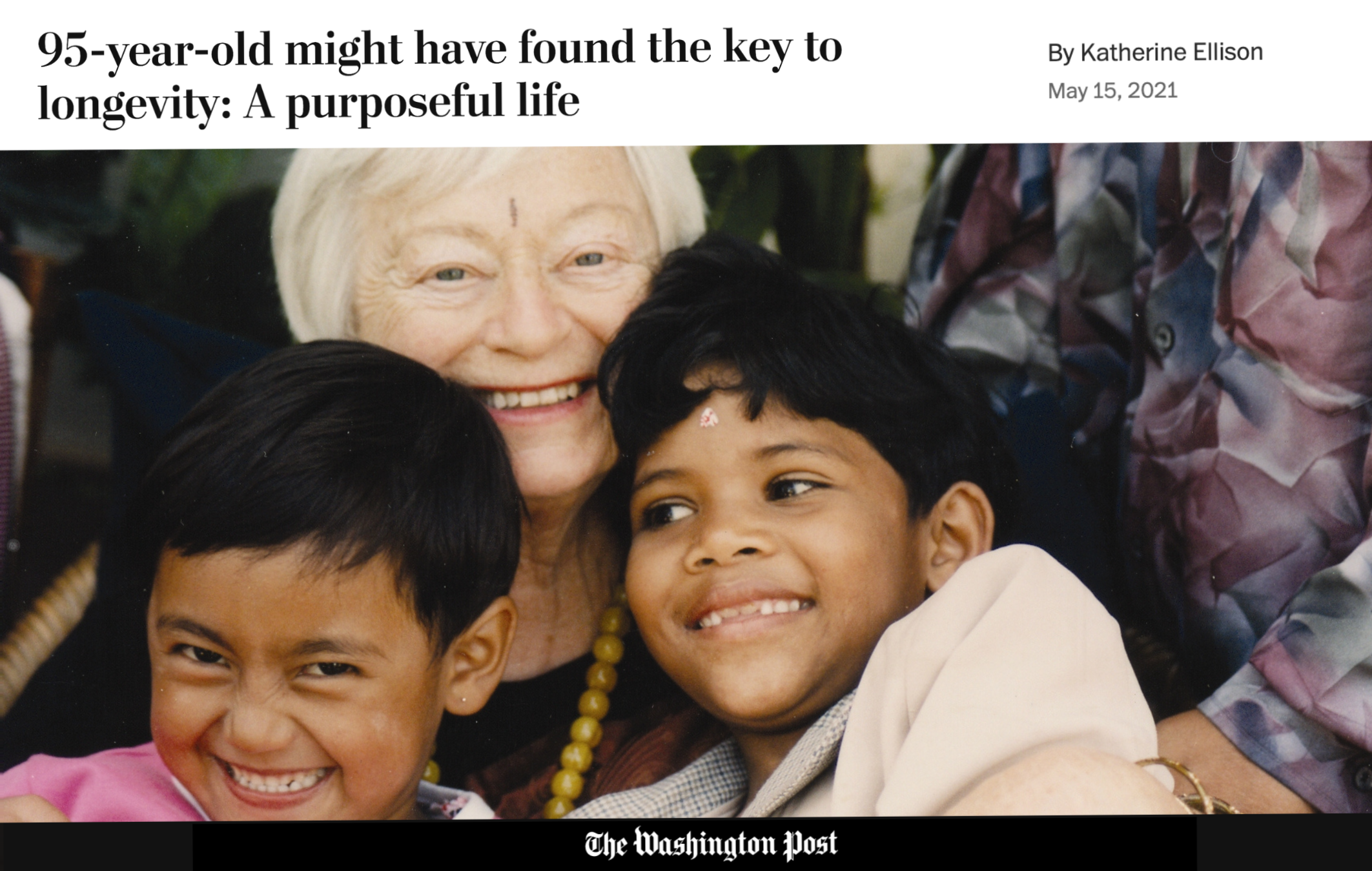
Purposeful living is the focus of a new Washington Post article about our very own founder, Olga Murray (click the link to open the article in a new tab – it is a beautiful tribute by Pulitzer-Prize winner Katherine Ellison!). Our beloved Olga, on the cusp of her 96th birthday, has been an inspiration during the past year of lockdowns and uncertainty.
‘ “I’m not a doctor,” ‘ the article quotes Olga during a recent interview, ‘ “but I do know that when I get out of bed every morning and think that I might help a little kid in Nepal, I’m not focused on my body… My main focus is on the kids.”
In her interview, Olga is characteristically modest. So much of Olga’s work is driven by her belief in others. She believes in those she partners with at NYF, like President Som Paneru. She believes in her friends, her connections – all those generous donors who make her work possible. Most of all, she believes in the children of Nepal, and in the incredible things they can accomplish if given the proper opportunities. (Bishnu Chaudhary, the young woman freed from domestic slavery who recently passed the Nepalese bar exam, is just one example!)
Even with purposeful living fueling her longevity, “I’m not going to be around forever,” Olga says pragmatically. “And the thing I want most in the world is for this program to go on.”
The NYF community is determined to make that wish come true.
If you’d like to learn more (and to see Olga Murray live over Zoom!), click here to register for our upcoming virtual Founder’s Day celebration! Join NYF’s email list here.
To support NYF’s mission during this challenging time – bringing Education, Health, Shelter, and Freedom to Nepali children – please donate here. For more powerful impact, consider making yours a monthly donation!
Female Lawyers – A New Milestone for the Freed Kamlari Community
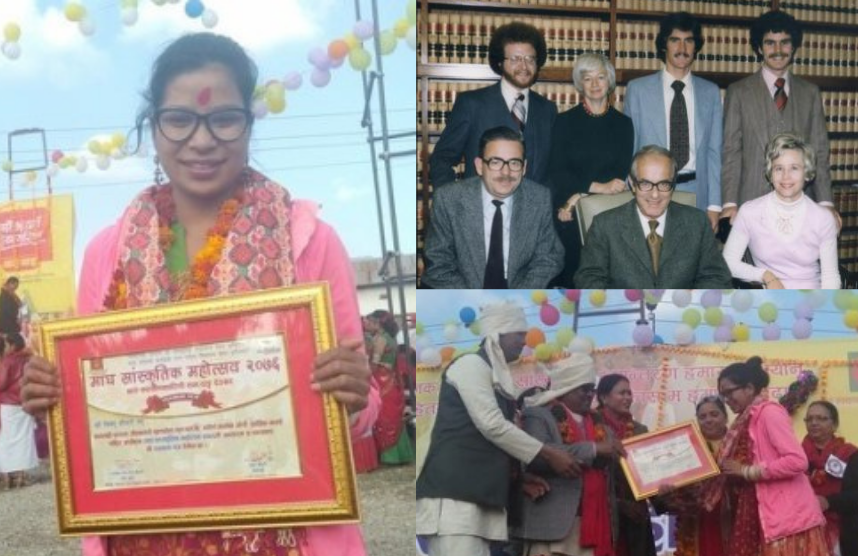
Female lawyers hold a special place in my heart—especially those embarking on this challenging career in a time and place in which women are not always welcome.
For those who do not know me, welcome! I am Olga Murray, the founder of Nepal Youth Foundation. Since the mid-1980s, I have dedicated my life to helping the children of Nepal to achieve their dreams. The work is an incomparable joy! Many of these kids’ successes have absolutely astonished me.
I have recently learned from Som that Bishnu Chaudhary has passed the bar exam in Nepal. This makes her the first Freed Kamlari to become a lawyer.
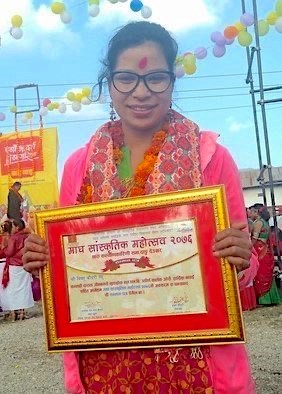
Kitchen Slavery
Bishnu’s father sold her into kamlari bondage when she was ten years old. Initially, he needed her wages to pay off a debt of under $40 (at the current rate of exchange), and later to assure that he could continue to work as a farmer for her employer. If she had stopped working, her family would have been left with no land to farm—and no way to feed themselves.
As a kamlari servant, Bishnu was denied an education and was instead forced to spend her childhood working long hours doing laundry, dishes, housework, and other tasks assigned by her family’s landlord. It was hard, demeaning work in an unforgiving environment. This was no place for a child.
(You can learn more about the kamlari practice, and NYF’s response, here.)
Rescue & Education
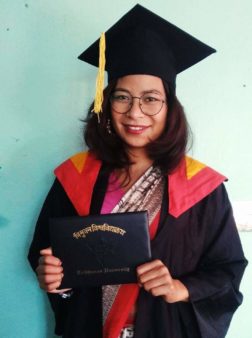
NYF rescued Bishnu from kamlari bondage in 2004, as our Indentured Daughters program (later the Empowering Freed Kamlari program) began to take root in the impacted Tharu communities.
She wanted desperately to go to school, and though her father at first refused, the teachers at the local school convinced him to allow her to enroll. Bishnu proved to be an outstanding student throughout her school years, taking as many opportunities for growth and development as she could. NYF has proudly supported her education from the beginning. Bishnu was admitted to law school in Kathmandu and graduated last year (pictured above).
Social Activism
During her student years, Bishnu was an outspoken and passionate leader in opposing the practice of kamlari, leading rescue operations of indentured children and convincing parents not to send their daughters away. She even risked being expelled from school because she insisted on liberating kamlari who were working for her own headmaster and teachers. Now that’s courage!
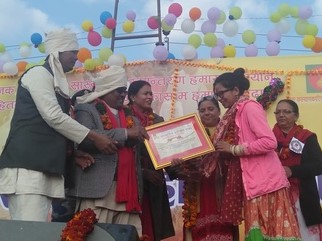
At Maghe Sankranti 2020, before the pandemic, Bishnu’s local government presented her with an award for the work she has done for her community (pictured left). I am gratified to see the ways these women, once mistreated and made to feel worthless, are being recognized and honored for their remarkable achievements.
Bishnu has continued in her activism, providing counseling and advice for former kamlari. Her aim is to advocate for girls and women in all aspects of the law – a tall order in Nepal, where paternalism reigns supreme.
A New Milestone
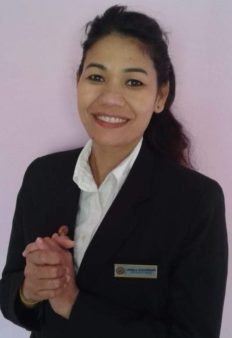
Female lawyers are a new phenomenon for Bishnu’s ethnic minority community, the Tharu. But Bishnu is just the first in the pipeline.
Up next is Urmila (left), the leader and heroine of the anti-kamlari movement, who was indentured at the age of six and did not begin school until she was 18, against the advice of almost everybody. Urmila is in her second year of law school and intends to work in the area of human rights, particularly women’s rights, after graduation.
How exciting to know Tharu women will have powerful female lawyers representing them in Nepal, and showing young girls what women can accomplish!
International Women’s Day 2021
I identify with these young women because, although I have never been sold into indentured servitude, I know the difficulty of embarking on a career in which women were not always welcome. I graduated from law school 66 years ago (gulp!), becoming a female lawyer at a time when there were few women in the profession, and the prospect of looking for a job was terrifying.
I was honored to spend my career in the company of those working to advance the rights of minorities in the United States. Below, I stand with my colleagues as a research attorney for California Supreme Court Justice Stanley Mosk.
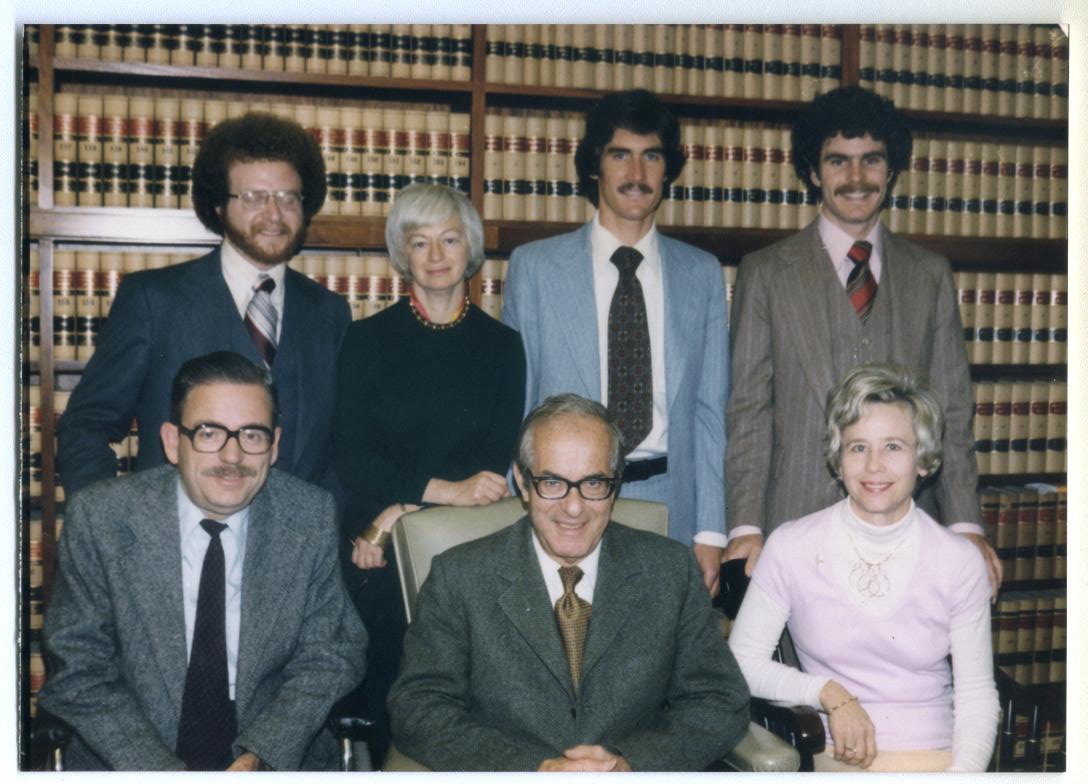
International Women’s Day, now held on March 8th, has been celebrated since 1911, when it was organized in Europe. Women then were campaigning for women’s rights to work, vote, be trained, hold public office, and end discrimination. Other early causes involved labor legislation about safety standards and child labor, combatting violence against women, and agitation for peace.
Now, this day is an opportunity to celebrate women’s achievements, raise awareness about women’s equality, and lobby for change.
The International Women’s Day theme in 2021 is “Choose to Challenge”—something the NYF Family has been doing for over 30 years, and something the Freed Kamlaris have done with gusto.
The work isn’t finished—but change is coming, one milestone at a time.
Today, for the Freed Kamlari communities, Bishnu, Urmila, and other daring women are choosing to challenge the status quo in their countries. I have full confidence that both Bishnu and Urmila will succeed in their goal to improve the status of women in Nepal because of their determination, their smarts, and the lessons they learned in their struggles to overcome injustice.
Maghe Sankranti, NYF and Freed Kamlaris Celebrate 20-Year Journey
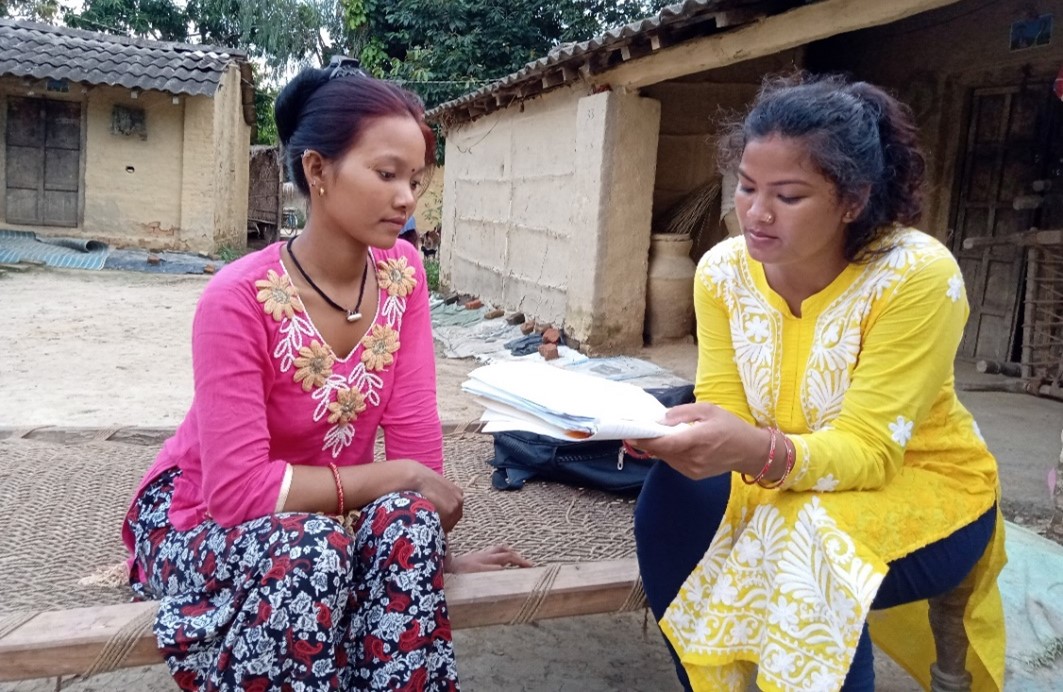
Maghe Sankranti 2021
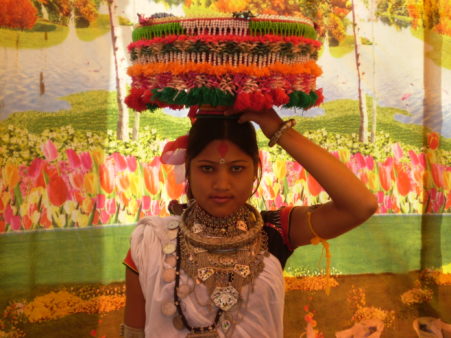
(Above, Jamuna Tharu, a Freed Kamlari and social motivator, prepares to celebrate Maghe Sankranti in 2009.)
Maghe Sankranti – The Tharu people in Nepal’s Terai region celebrate their New Year on Maghe Sankranti, which falls in mid-January. In 2021, that day was January 14th. Happy New Year!
For generations, this auspicious day had a grim meaning for young Tharu girls. Maghe Sankranti was the day the year’s debts came due. On this day, many families settled their debts in the only way available to them: by bonding their young daughters for a year of indentured servitude in the homes of strangers in Nepal’s urban areas. For these girls, some as young as five or six years old, “Happy New Year” meant goodbye to the safety of home—and a frightening journey to a life of kitchen slavery, dehumanization, and abuse. Bonded girls were known as kamlari.
But now, the girls freed from this practice are grown up and ensuring freedom and justice for their sisters. As the Freed Kamlari celebrate Maghe Sankranti this year, they are celebrating hard-won victories built over the past 20 years—including the certainty that the daughters of their minority ethnic group will never again be bonded away.
NYF began fighting the kamlari practice in 2000, with Som Paneru, Olga Murray, and Man Bahadur Chettri leading the way in developing long-term, targeted programming designed to free, heal, educate, and empower the individual girls and to challenge Nepal’s government to eradicate the practice once and for all.
Nepal’s government made the kamlari practice illegal in 2013.
In 2020, we published a three-part series celebrating the Empowering Freed Kamlari program’s transition to Tharu control, the rising leaders of the Kamlari Movement, and the ways the Freed Kamlari Development Forum is providing community support during COVID-19.
Today, NYF is proud to share another resource with the NYF Family: an in-depth study on the impact of our 20-year efforts to empower young women impacted by the kamlari practice.
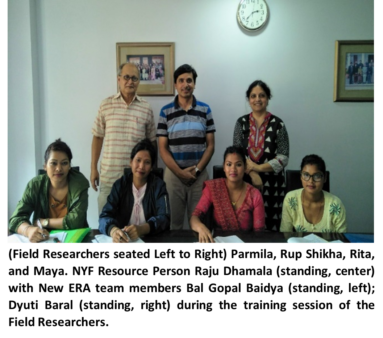
Click here to download the full independent study!
This study was conducted by an independent group of field researchers in 2019. They interviewed a sample of the women freed from the kamlari practice through NYF’s efforts, focusing their questions on topics linked to NYF’s mission: health, shelter, education, and freedom/empowerment.
During the 20-year Empowering Freed Kamlari program, NYF rescued 12,932 girls from domestic bondage. At NYF, we try to focus on individual stories as much as possible. But what about the other thousands of individuals served? If you’re interested in statistics about the broader impacts of our work, please read on!
We’re proud to report that the findings were incredibly positive! In almost all cases, the Freed Kamlaris and their families were not only doing better than they had before NYF intervened—they were doing better than national averages!
Here are just a few highlights:
Health
Other than offering mental health services through Ankur Counseling Center, the Empowering Freed Kamlaris program was not focused on health or health services. But researchers were surprised to discover the ripple effects of NYF’s focus on education.
Women impacted by the Empowering Freed Kamlaris program report much higher than average access to health education and resources for themselves and their families. For example…
Freed Kamlaris are having fewer children than their mothers did—an average of 1.5, which is lower than the national average. They report using family planning methods to ensure their families don’t grow larger than they can support.
Of the Freed Kamlaris with children, 88.7% delivered their last child in a healthcare facility, 97.2% had at least one prenatal checkup, and 82.4% had four or more prenatal checkups. A whopping 93.4% had had all of their children fully immunized as recommended for their age. All of them had had their children at least partially immunized.
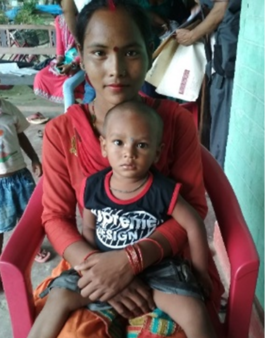
(Above, a 20-year-old married Freed Kamlari shows off her one-year-old son during her interview.)
Shelter
Extreme poverty was the main reason families reported for bonding their girls into the kamlari practice. NYF worked to ensure better economic resources for the girls we served, but home-building was not part of our programming.
Yet now, over 80% of Freed Kamlaris and their families live in homes constructed at least in part with “improved” materials. This includes at least one (and often a combination) of materials like galvanized sheet roofing (instead of thatch), cement or stone flooring (instead of earth), and brick or cement walls (instead of mud or bamboo).
Additionally, 90% of these families have access to sanitation facilities (plumbing) within their homes. Of the 9.5% using outhouses instead, many reported that this was intentional. Such facilities inside the home can be considered “polluting” for religious and cultural reasons, and many of the Freed Kamlaris rescued in early years reported that being forced to clean modern toilets was among their most demeaning experiences as kamlari.
When asked about their household’s main source of energy for lighting, 91.3% used electricity—a high proportion, indicating relative affluence. But 6.5% of the Freed Kamlaris surprised the researchers by reporting their use of solar panels! Off-the-grid energy sources were so unexpected, they had to be added to the list of options on field researcher questionnaires.
Improved housing is one of many ways these empowered women have leveraged their education and economic power to better their own lives.
Education
Education was a primary focus of NYF’s Empowering Freed Kamlari efforts from the very beginning. The earliest girls rescued returned home because NYF promised their families a piglet or goat in exchange for their daughters’ freedom to live at home and attend school.
The response was so strong that classrooms in the Terai region of Nepal were soon overwhelmed with too many students. Some in local government complained that NYF was causing problems for the school system! NYF responded by building 61 additional classrooms between 2004 and 2014 as well as ensuring schools had access to sufficient trained teachers, toilets, drinking water tanks, and furniture.
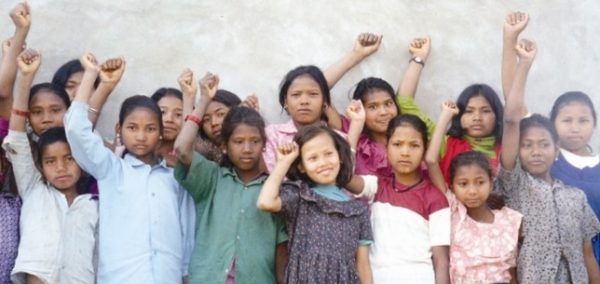
(Above, a group of newly-freed Tharu girls prepare to enter school in 2003.)
NYF also established and ran “catch up” classes to help young girls deprived of early education during their kamlari years. These courses ensured students could succeed alongside classmates close to their own age, instead of forcing teenagers to attend school with kindergarteners.
Now, Nepal’s national literacy rate stands at 67%. Among Freed Kamlaris, literacy is at 97%.
The average Nepalese adult today has completed 4.9 years of education. Among Freed Kamlaris, the average is 8 years—and rising, as 22.4% of Freed Kamlaris are still in school! About 30% of these women have completed grade 10 (the rough equivalent of finishing high school in the US).
Nearly two-thirds of the parents of Freed Kamlaris—61%!—had begun sending their sons to school once they saw their daughters going.
About one in three Freed Kamlaris have completed a vocational training course or received technical education in a field like engineering, computer technology, health care, dressmaking, poultry farming, or screen printing.
Around 4,000 Freed Kamlaris have received additional training through NYF in community leadership, cooperative management, organizational development, and entrepreneurship.
Just under 90% of Freed Kamlaris named educational opportunity as a way their rescue had improved their lives.
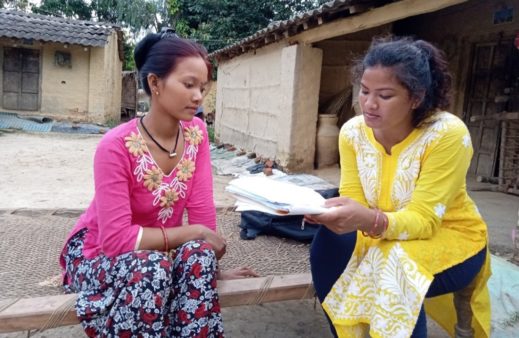
(Above, a Freed Kamlari, in pink, tells a field researcher about life since her rescue. All of the field researchers were women fluent in the Tharu language.)
Freedom
In many cases, freedom comes from education and economic empowerment.
Family members of the Freed Kamlaris reported that 92.3% of these women are currently contributing to household expenses (and remember, this includes the 22.4% who are attending school!). A similar number—91.1%—said that their family’s economic condition had improved in the last 10 years.
These families say the economic improvement came from their newfound ability to buy their own farmland or rent a larger area of sharecropped land, from the ability to start small businesses, or because of the employment of a family member.
About 29% of Freed Kamlaris are either employed or own a nontraditional business, including nontraditional crops like henna and mushrooms. This may seem like a low number, but the Tharu people are primarily a culture of farmers—so 29% is an enormous uptick!
Those Freed Kamlaris who have chosen to continue following the agricultural path are reporting huge advances as well. A full 75.1% of their families grow enough food to make their families entirely or almost entirely self-sufficient year-round through farming alone—an enormous blessing in tough economic times like the world is experiencing now.
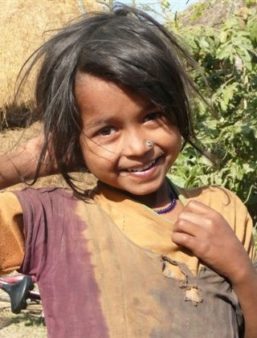
(Above, a young Tharu girl grins at the camera. Taken during the early years of NYF’s involvement with the Tharu people, this photo captures a moment very soon after this child’s return from her time as a kamlari.)
But freedom is also an internal experience—confidence in oneself and the ability to make decisions.
Researchers asked Freed Kamlaris whether they were allowed to make decisions in important areas of their lives: what age to marry, who to marry, whether or not to attend school, subjects to study in school, what career or job to pursue, and how to spend one’s earnings.
The area of least empowerment was what age to marry—90% of Freed Kamlaris were empowered to choose when to marry. (A main focus for the Freed Kamlari Development Forum is combatting early marriage in the region.)
When asked about subjects to study in school, 100% of these remarkable women reported they were empowered to make their own choices.
Freed Kamlaris were also found to have a high level of self-confidence that surprised the Nepalese researchers. These women were much more confident in themselves and their futures than the average Nepalese adult! The researchers also noted that this high confidence went hand-in-hand with grounded, realistic thinking.
A full 84.5% of Freed Kamlaris believed that their lives would improve over the next 5 years—and none believed they would be worse off.
Over 2/3 believed they would be able to take better care of their families in 5 years, and 54.7% saw themselves becoming more self-confident during the same time.
Ten percent of Freed Kamlaris hold leadership positions in community groups, and 21.5% are involved in social activism focused on the kamlari movement, ending violence against women, and ending early child marriage.
At NYF, we have so much to celebrate this Maghe Sankranti!
Thank you to every NYF donor for each thoughtful gift you have invested into these women and girls over the past 20 years. Your love—offered in the form of piglets, scholarships, start-up funds, vocational training, word-of-mouth, and so much more—have built opportunities and strength for a generation of young women. Dhanyabad! We are so grateful for your belief in these girls.
Now, 20 years after Som and Olga learned of the kamlari practice in Western Nepal, the journey continues for these incredible women as they step forward with new independence. The program’s valuable work is being carried forward with strength by the Freed Kamlari Development Forum—a Terai-based nonprofit led by the Freed Kamlaris themselves.
At NYF, we’re excited to step forward as well, putting 20 years of expertise to good use helping empower women and girls through new and continuing programming! We’re using the lessons learned over 20 years to continue serving communities of children throughout Nepal, ensuring their access to Health, Freedom, Shelter, and Education.
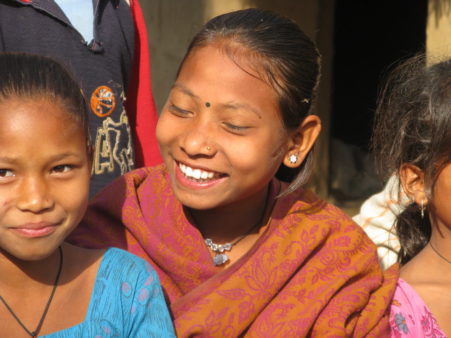
A freed girl grins in a bright moment during a 2009 celebration of the Freed Kamlari movement’s progress. Nepal would not make the practice illegal until 2013, but this girl knew the future was bright and change was on the horizon.